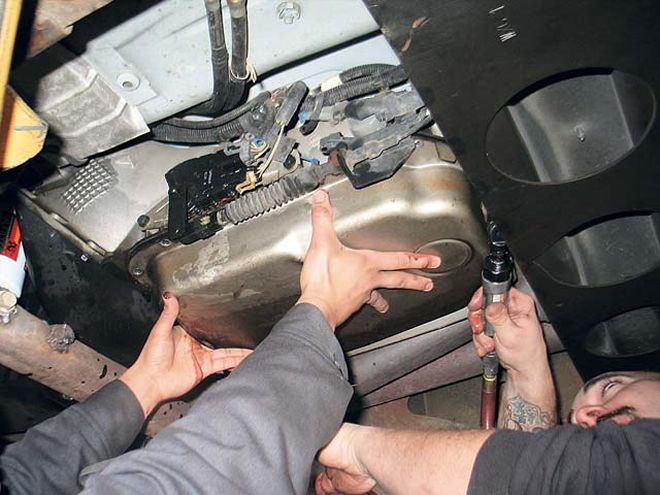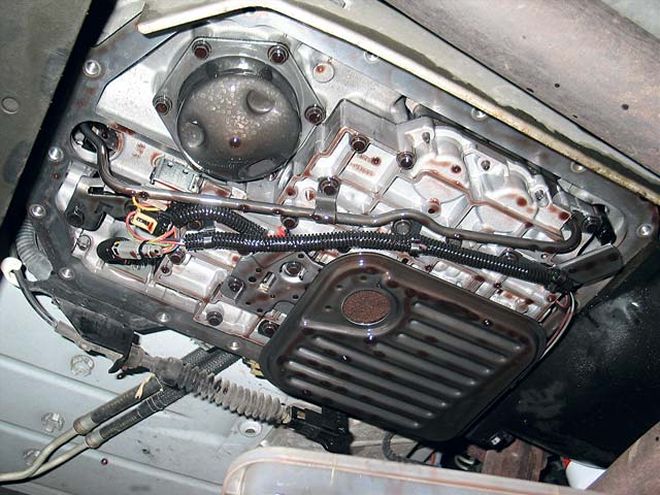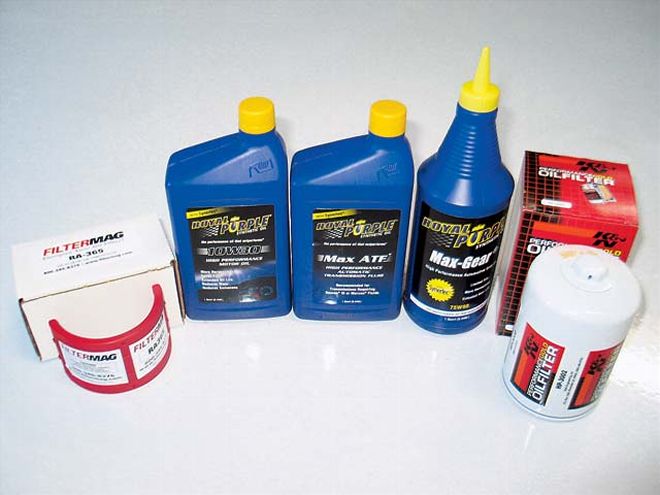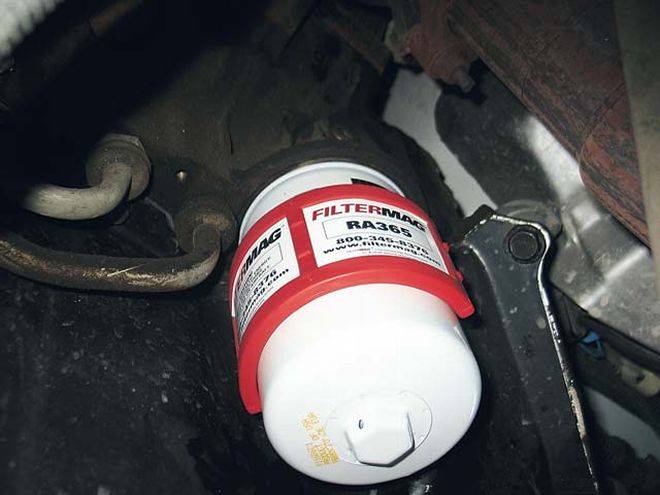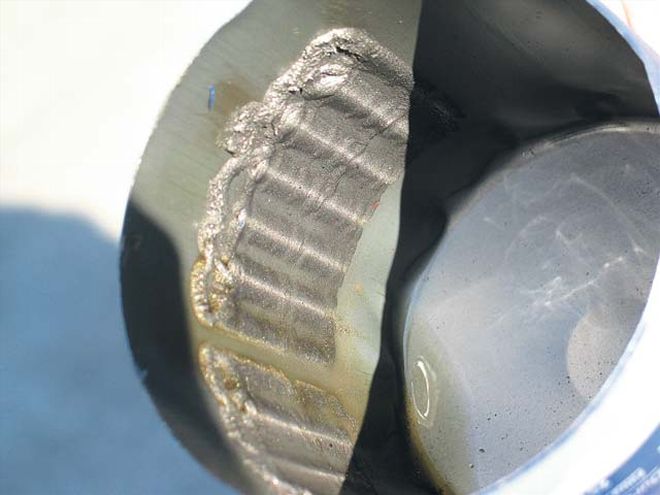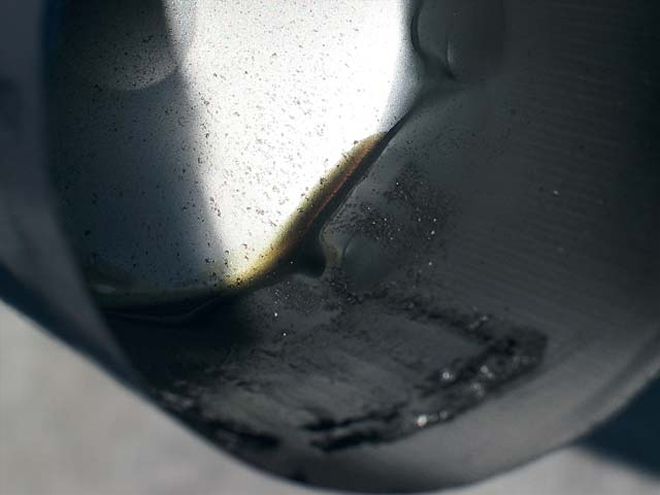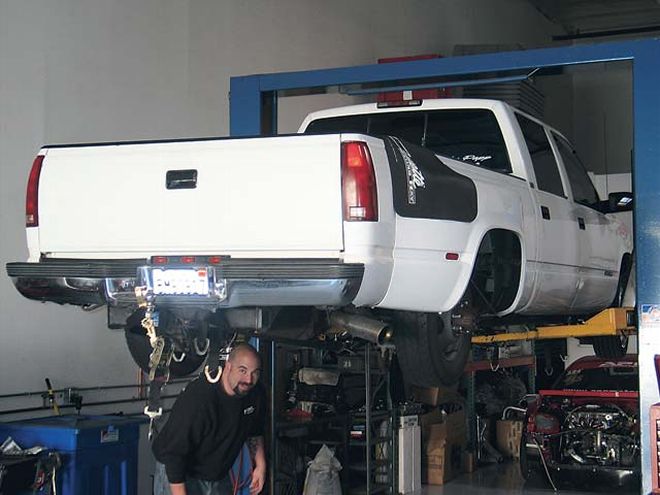
| 1. Our guinea pig is the same '96 Chevy C3500 dually tow pig that you read about in past issues of Sport Truck. It's frequently ridden hard and put away wet and used daily for commuting purposes. We routinely run conventional 10W-30 gear oil in the 7.4L Vortec big-block Chevy, ATF in the 4L80-E transmission, and 75W-90 gear oil in the Corporate 14-bolt rearend. After three baseline pulls by "Jersey" Steve on Westech's dyno to find a power average, we got crackin' and put the truck up on the lift.
Regularly scheduled maintenance is a term you probably hear quite often. We read it incessantly in our trucks' owner's manuals. It's even used in car commercials as a selling point these days with several automakers offering it for free when you buy a new vehicle. We tend to put a lot of miles on our test trucks here at Sport Truck, which means we are constantly performing routine maintenance such as changing the engine and transmission fluids, and we often keep track of our trucks' fuel economy before and after just to see what happens when we change brands or types of fluids. Most times, switching brands doesn't mean much in terms of vehicle performance, so we merely observe the trip odometer and how much gas our truck sucks up at each fill-up. This isn't one of those occasions. We tested a line of products specifically aimed at helping engines make more power, reduce emissions, and reduce fuel consumption, so we headed right to a dyno to find out the real deal.
Recently, we decided to switch one of our trucks over to synthetic fluids to see what all the hype was about. While we can't judge how well fluids like those offered by Royal Purple protect the bearing surfaces in our engine in a timely manner, we can find out if the stuff reduces friction in the drivetrain using a chassis dyno. We headed over to Westech Performance Group's new Superflow chassis dyno with engine, transmission, and axle lubricants in hand and ran the truck on the slick stuff and conventional oils. What we found was pretty interesting. Royal Purple's Max ATF, Max Gear, and 10W-30 synthetic motor oil indeed added 10 hp and 12 lb-ft of torque to our truck. We spent 30 minutes changing the fluid from the engine crankcase, transmission pan, and rear differential, and in back-to-back dyno runs found additional power made versus running conventional oils.
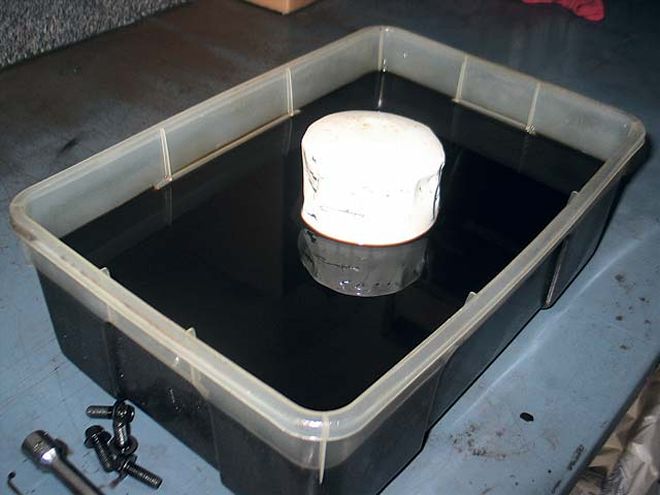
| 2. Starting at the front of the truck, the oil was drained and the filter removed.
Ten horsepower measured at the wheels is substantial, especially when you factor in the cost of making the switch to fluids with extended service life. Sure the stuff costs more, but you can skip the standard 3,000-mile oil change and wait another 6,000 to 9,000 miles before you replace Royal Purple products, which means you are not only improving the performance of your sport truck but saving money as well. Here's a look at how easy it was to make the switch and at a couple of other cool products to make the most of your time spent beneath your truck.
FAQsSince we are talking so much about the power potential of synthetic lubricants, we decided to find out Royal Purple's stance on some longstanding questions about its products. We spoke with Patrick Burris, Royal Purple's motorsports marketing coordinator.Sport Truck - Why do engine builders commonly tell us not to break in a new motor using synthetic motor oil?
Patrick Burris - To allow for proper break-in of the engine, Royal Purple recommends waiting until the manufacturer's first scheduled oil change or a minimum of 2,000 miles in new gasoline engines. Allow 8,000 to 10,000 miles before using Royal Purple in diesel engines. Royal Purple's high film strength will not allow the piston rings to scuff the cylinder walls. Until the piston rings form a seal in the cylinder, the engine will consume oil and not perform as well as it should.
Sport Truck - How come many drivetrain shops recommend not putting synthetic fluid into the differential?
Patrick Burris - I don't know for sure, but it is most likely they had some differential failures when synthetic lubricants first came out. With today's test standards and additive technology, this should not happen as long as the correct viscosity and GL rating is used. Fact is, a properly formulated gear oil will protect the gearset whether the base oil is mineral or synthetic. Nowadays, GM and Ford trucks and performance rear-wheel-drive cars come factory-filled with synthetic gear oil.
 | 1. Our guinea pig is the same '96 Chevy C3500 dually tow pig that you read about in past issues of Sport Truck. It's frequently ridden hard and put away wet and used daily for commuting purposes. We routinely run conventional 10W-30 gear oil in the 7.4L Vortec big-block Chevy, ATF in the 4L80-E transmission, and 75W-90 gear oil in the Corporate 14-bolt rearend. After three baseline pulls by "Jersey" Steve on Westech's dyno to find a power average, we got crackin' and put the truck up on the lift.
Regularly scheduled maintenance is a term you probably hear quite often. We read it incessantly in our trucks' owner's manuals. It's even used in car commercials as a selling point these days with several automakers offering it for free when you buy a new vehicle. We tend to put a lot of miles on our test trucks here at Sport Truck, which means we are constantly performing routine maintenance such as changing the engine and transmission fluids, and we often keep track of our trucks' fuel economy before and after just to see what happens when we change brands or types of fluids. Most times, switching brands doesn't mean much in terms of vehicle performance, so we merely observe the trip odometer and how much gas our truck sucks up at each fill-up. This isn't one of those occasions. We tested a line of products specifically aimed at helping engines make more power, reduce emissions, and reduce fuel consumption, so we headed right to a dyno to find out the real deal.
Recently, we decided to switch one of our trucks over to synthetic fluids to see what all the hype was about. While we can't judge how well fluids like those offered by Royal Purple protect the bearing surfaces in our engine in a timely manner, we can find out if the stuff reduces friction in the drivetrain using a chassis dyno. We headed over to Westech Performance Group's new Superflow chassis dyno with engine, transmission, and axle lubricants in hand and ran the truck on the slick stuff and conventional oils. What we found was pretty interesting. Royal Purple's Max ATF, Max Gear, and 10W-30 synthetic motor oil indeed added 10 hp and 12 lb-ft of torque to our truck. We spent 30 minutes changing the fluid from the engine crankcase, transmission pan, and rear differential, and in back-to-back dyno runs found additional power made versus running conventional oils.
| 1. Our guinea pig is the same '96 Chevy C3500 dually tow pig that you read about in past issues of Sport Truck. It's frequently ridden hard and put away wet and used daily for commuting purposes. We routinely run conventional 10W-30 gear oil in the 7.4L Vortec big-block Chevy, ATF in the 4L80-E transmission, and 75W-90 gear oil in the Corporate 14-bolt rearend. After three baseline pulls by "Jersey" Steve on Westech's dyno to find a power average, we got crackin' and put the truck up on the lift.
Regularly scheduled maintenance is a term you probably hear quite often. We read it incessantly in our trucks' owner's manuals. It's even used in car commercials as a selling point these days with several automakers offering it for free when you buy a new vehicle. We tend to put a lot of miles on our test trucks here at Sport Truck, which means we are constantly performing routine maintenance such as changing the engine and transmission fluids, and we often keep track of our trucks' fuel economy before and after just to see what happens when we change brands or types of fluids. Most times, switching brands doesn't mean much in terms of vehicle performance, so we merely observe the trip odometer and how much gas our truck sucks up at each fill-up. This isn't one of those occasions. We tested a line of products specifically aimed at helping engines make more power, reduce emissions, and reduce fuel consumption, so we headed right to a dyno to find out the real deal.
Recently, we decided to switch one of our trucks over to synthetic fluids to see what all the hype was about. While we can't judge how well fluids like those offered by Royal Purple protect the bearing surfaces in our engine in a timely manner, we can find out if the stuff reduces friction in the drivetrain using a chassis dyno. We headed over to Westech Performance Group's new Superflow chassis dyno with engine, transmission, and axle lubricants in hand and ran the truck on the slick stuff and conventional oils. What we found was pretty interesting. Royal Purple's Max ATF, Max Gear, and 10W-30 synthetic motor oil indeed added 10 hp and 12 lb-ft of torque to our truck. We spent 30 minutes changing the fluid from the engine crankcase, transmission pan, and rear differential, and in back-to-back dyno runs found additional power made versus running conventional oils.
 | 2. Starting at the front of the truck, the oil was drained and the filter removed.
Ten horsepower measured at the wheels is substantial, especially when you factor in the cost of making the switch to fluids with extended service life. Sure the stuff costs more, but you can skip the standard 3,000-mile oil change and wait another 6,000 to 9,000 miles before you replace Royal Purple products, which means you are not only improving the performance of your sport truck but saving money as well. Here's a look at how easy it was to make the switch and at a couple of other cool products to make the most of your time spent beneath your truck.
| 2. Starting at the front of the truck, the oil was drained and the filter removed.
Ten horsepower measured at the wheels is substantial, especially when you factor in the cost of making the switch to fluids with extended service life. Sure the stuff costs more, but you can skip the standard 3,000-mile oil change and wait another 6,000 to 9,000 miles before you replace Royal Purple products, which means you are not only improving the performance of your sport truck but saving money as well. Here's a look at how easy it was to make the switch and at a couple of other cool products to make the most of your time spent beneath your truck.